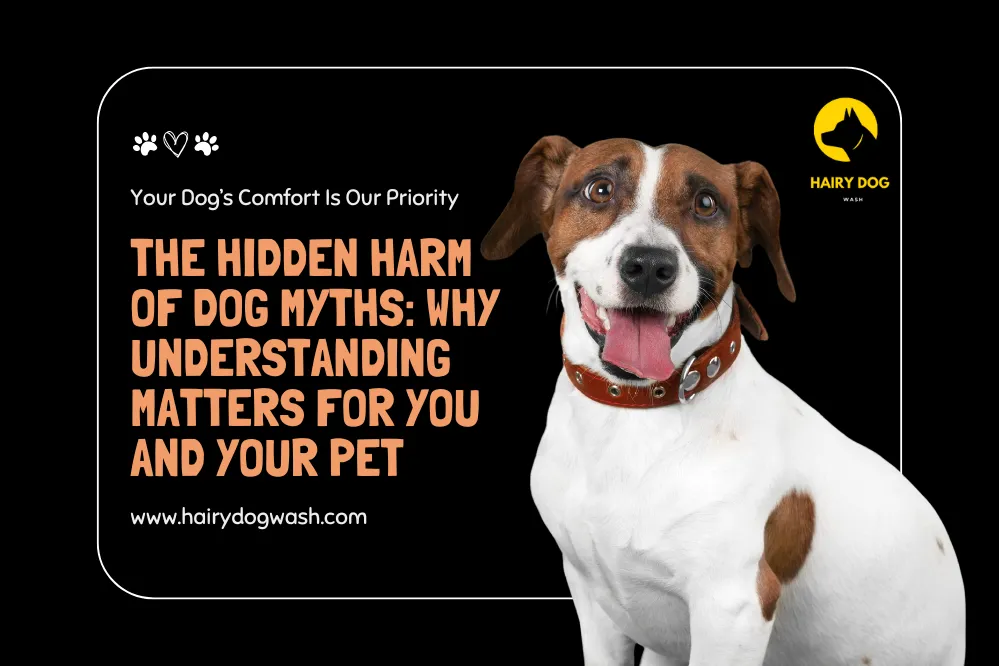As dog lovers, we all want what’s best for our furry companions. But what if some of the beliefs we hold about them are causing more harm than good?
From outdated ideas about dominance to the misconception that dogs live only in the present, these myths not only impact our pets’ well-being but also weaken our bond with them.
Let’s bust some common myths that could be affecting how you understand and care for your dog. Do check out our favourite doggie makeovers.
Myth 1: Dogs Only Live in the Moment

It’s a feel-good thought that dogs live entirely in the present, free from worries about the past or future. However, science paints a different picture. Dogs have both short-term and long-term memory. They can recall past experiences, which influence their behavior, and even anticipate events based on routines.
For instance, your dog might wag their tail when you pick up a leash because they anticipate a walk. This understanding is crucial—assuming your dog “forgets everything” could lead to neglecting trauma or emotional needs stemming from past events.
Myth 2: All Dogs Are Unconditionally Loving
Dogs are often celebrated as symbols of unconditional love, but this isn’t always the case. Just like people, dogs have unique personalities and preferences. They may bond deeply with some individuals while feeling indifferent or even wary around others. This doesn’t mean your dog loves you less—it simply means they are complex creatures with emotions that deserve respect.
Myth 3: Hugs Are Always Welcome

You might think hugging your dog is the ultimate way to show love, but not all dogs enjoy being hugged. For some, this action feels restraining or threatening, triggering stress or discomfort. While your dog may tolerate hugs out of trust, always pay attention to their body language. Are their ears pulled back? Is their tail tucked? Respecting their comfort levels will deepen your bond.
Myth 4: Dogs Don’t Hold Grudges
The idea that dogs don’t hold grudges is another myth that oversimplifies their emotional world. While they don’t hold onto anger in the way humans might, dogs do remember negative experiences and can develop aversions based on them. For example, if your dog was frightened during a trip to the vet, they might resist going back. Understanding this helps us address behavior with empathy rather than frustration.
Myth 5: Dogs See Humans as Alpha Leaders
The outdated idea that dogs see humans as “alphas” needing constant dominance is misleading. Modern research shows that the human-dog relationship is far more collaborative. Dogs thrive on mutual trust and respect, not dominance. Training methods rooted in positive reinforcement—not fear—build better behavior and a stronger bond. You should also bathe your dog once a while to keep them in a good health.
Why Busting These Myths Matters
Believing these myths can lead to actions that unintentionally harm your dog. For example, thinking they live only in the moment might cause you to overlook how past trauma affects their current behavior. Or assuming all dogs love hugs could lead to unnecessary stress for your pet. By challenging these myths, you not only improve your dog’s well-being but also enhance your relationship with them.
Tips for Building a Stronger Bond with Your Dog
• Learn About Dog Behavior: Take time to educate yourself through credible resources or dog behavior experts.
• Observe Your Dog Closely: Every dog is unique. Pay attention to their cues, preferences, and reactions.
• Use Positive Reinforcement: Reward-based training is far more effective than punishment. Celebrate good behavior instead of focusing solely on correcting bad habits.
• Respect Their Boundaries: If your dog is uncomfortable with hugs or certain interactions, adapt how you show affection.
Final Thoughts: Embracing the Truth About Dogs
Understanding the truth behind these myths allows us to connect with our dogs in more meaningful ways. Dogs aren’t simple, one-dimensional creatures—they’re emotional, intelligent beings who deserve thoughtful care and respect. By shedding harmful myths, you can create a happier, healthier life for your pet and strengthen the incredible bond you share. Follow hairydogwash.com for more such posts.
Take this as a reminder: loving your dog means understanding them. And sometimes, that starts with unlearning what you thought you knew.

